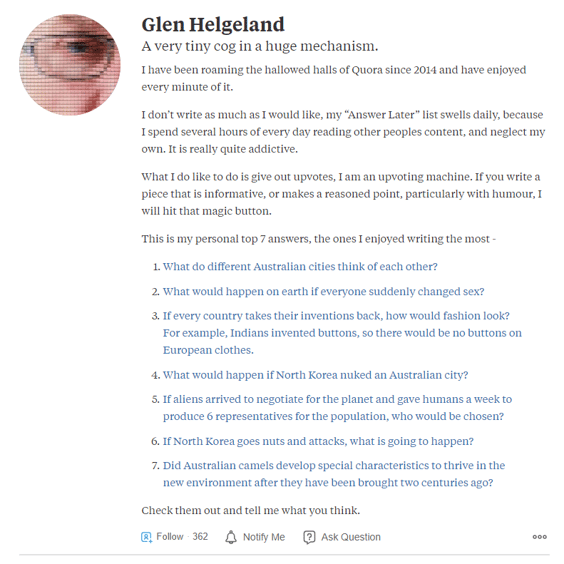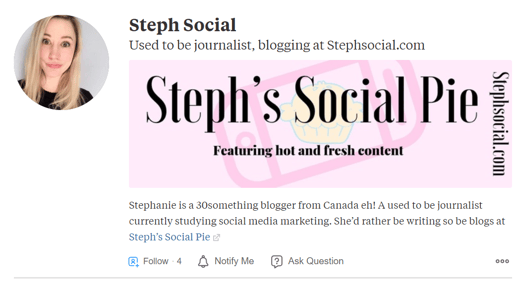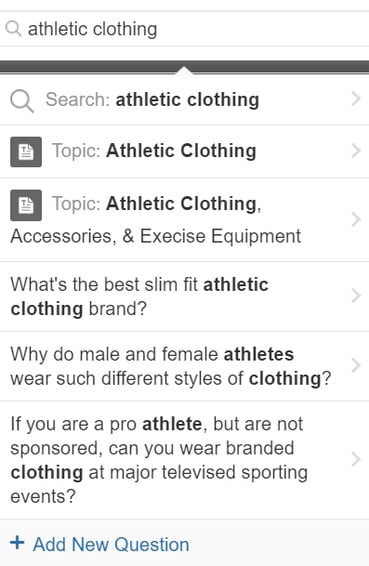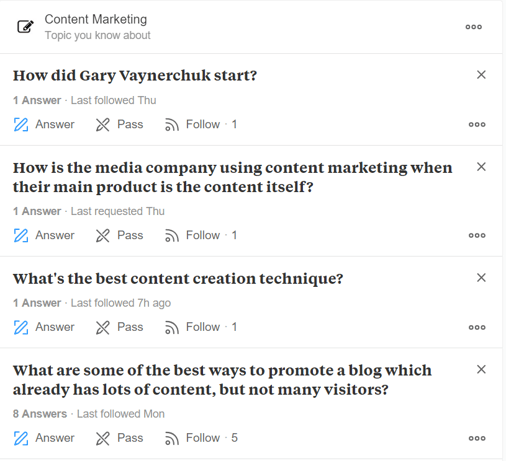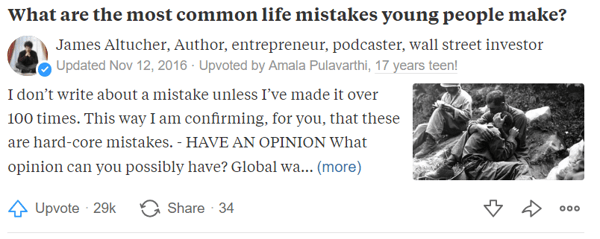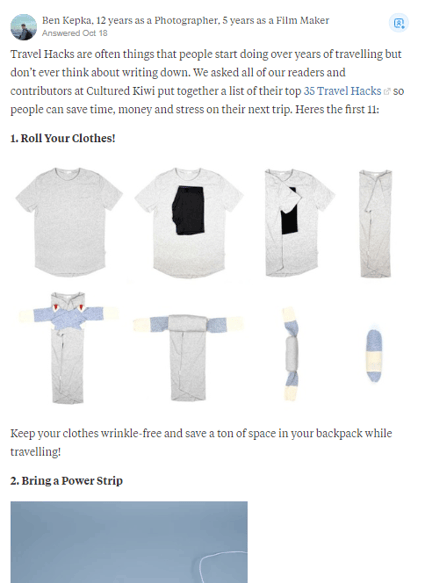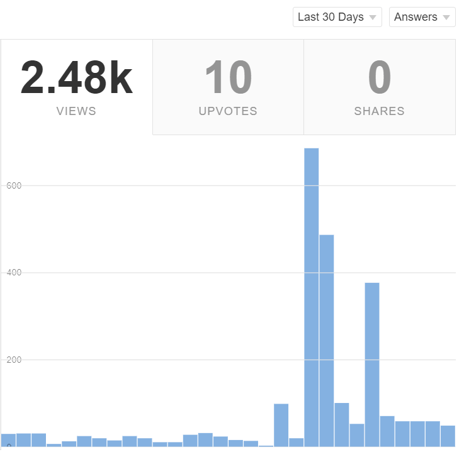No site has come close to the question and answer platform that Quora has established.
With more than 80 million active users and an average of 5,000 questions a day, the site offers a ton of opportunities to marketers—if they can figure out how to use it.
A Quora marketing strategy doesn't need to be complicated to offer incredible advantages. With some all but guaranteed techniques, you too can enjoy the increased traffic as you grow your brand's reach.
Building a Quora Marketing Strategy That Engages Your Audience
You may think providing answers to questions is a waste of time. After all, that's what your blog is for right?
But Quora provides more opportunities for distribution, like other social channels you may use. It's not a place to just answer questions. For businesses, it's a fantastic avenue for engaging with an audience by providing value and building the trust that turns them into customers.
1. Create a Thorough Profile
The first step to building a well-crafted profile starts with your name. Obviously, you know your name, but with Quora, you get to decide how you want it listed. Are you a fancy middle initial user? Or do you prefer a nickname? It doesn't matter, so long as it's consistent with your personal brand.
For photos, pictures that are clear and bright attract viewers faster than the stock image Quora provides. Photos that show your face are also far better for gaining traction than using cartoons or random graphics. Though your profile image is less critical than the actual answers you provide, a good photo could slow someone from scrolling enough that they actually read your content.
The tagline is what announces your credentials to viewers. For example, if a question is about astronomy, one could use their education or current position if it relates. Your credential could also be a location you're from or an experience you've had. Quora lets you add nearly anything you want to this your list of credentials.
Taglines can be swapped out for each answer, so you can provide the credential that shows you're best qualified to comment.
Here's an example of a career-based credential:
A location-based credential:
And a less helpful one:
Next is your About Me section. This is where you can provide a biography on yourself. You can create a bio that promotes your work, like Glenn Helgeland's:
You could make it creative, like Vraj Patel:
Or you could take a promotional approach like Steph's Social:
No matter how you choose to build your About Me section, you should include enough that readers who enjoy your answers can learn what you do and where they can find your company's page.
By including any interests you have with your profile, Quora's search engine will add similar topics to your feed, providing you with material for reading, or even to add your own answers.
Accounts can be linked to your social profiles so it's easier to share your answers and for users to find you on other platforms.
Finally, if you have an answer that engages readers better than others, you can pin it to the top of your profile. Adding a pin gives new readers a chance to see the post, increasing views and potentially upvotes.
2. Target Topics
The next step is targeting what topics you want to engage with on the platform. They don't need to be explicitly focused on one niche, but they should be related to your primary industry.
For example, if you're in the athletic clothing industry, you may answer questions on fashion, style, or athletics. All of them can be traced back to your root focus.
The search engine on Quora allows you to look for topics, as well as specific questions. You can also search for influencers if their account has enough followers.
If there's a specific topic that you want to receive alerts from, you're able to set your profile to be notified when someone asks new or popular questions. You can even follow individual items to receive updates for answers you want to read.
The same can be done with individual accounts, which gives you an excellent time-saver in your search for good questions. If while answering questions, you find the same writer to be adding their own, you can follow their account. This will cause anything they answer to pop up in your feed, giving you instant access to all the questions you want to address without spending time looking them up.
3. Find Questions You're Qualified to Answer
Just like with content marketing, you only want to answer questions you can provide value to. It's the basis of customer-centric marketing, and there's no reason posting on Quora should be any different. Conducting research is fine, and encouraged, but your goal should be answering the question the best you can.
Quora gives you the ability to edit answers as well, so while you should be proofreading your content before you publish, you can also fix mistakes or add material later.
While people can read all the answers to a question, a scrollable list limits the amount visible without loading more. Because of this, users may miss your post unless it's one of the higher rated answers.
If a question has a large number of answers it becomes dramatically more difficult to get your post noticed. Quora stops counting at 100, adding a + to show a higher volume of answers. It's still possible to be seen, but as time goes on, your post will get lost in the noise.
Often, you may find questions where someone has already provided a detailed answer and you don't believe you can add value to the discussion. That's fine, just find a similar question to post to. It's not always easy to get a post noticed when a famous personality has already provided a popular answer.
The goal should be to find something that fits your wheelhouse, because if you can impress readers with your answer, they may request additional answers from you, by name. When this happens, you've got fantastic proof that your strategy is working.
4. Make Posts Appealing
Just as if you were writing a blog post, images and graphics serve an essential function. They break up the text, catch the eye, and as long as their relevant, can increase the value of your answer.
Answers will come with a "read more" tab, so if you're going to use images to grab someone's initial attention, it should be done early in your answer. There's no limit to image use, but if you're not using a free source, ensure you cite the owner.
Headings and subheadings won't appear the same way they do on your blog, but they're still a useful tool for breaking up your text into manageable, scannable chunks. The top rated posts range from 300 to 1000 words, so separating the post into sections is incredibly helpful for keeping your reader's attention.
To make your headings noticeable, capitalize the first letter of every word, put the text in bold, and leave it on its own line. While the size will be the same as the rest of the text, it'll stand out significantly better if done in this manner.
Bold and italicized text are great for highlighting important words are phrases, and they make it easier for the reader to remember key information. Like with other business strategies, making your post as convenient to your audience as possible will make them more apt to upvote and follow you for more content.
Another technique is called the "pattern interrupt." This means doing the opposite of every other post. If everyone is using images, don't. If everyone has walls of text, break yours up. The simple trick of stopping the pattern is enough to grab a reader's attention and get them initially invested in your answer.
We touched on it briefly earlier, but the most important thing to remember when answering a question is that you need to be qualified. And, even if you're not qualified, you need to be authentic in your post. Some experts post on Quora and if you're pretending to join their ranks, you'll likely face backlash through downvotes or negative comments.
5. Repurpose Content
Now, coming up with specific answers to questions can become a job on its own, and you still have a blog and marketing assets to manage.
To make this easier, we recommend finding the content you already have an answer for. This doesn't mean copying and pasting your other posts, but it does mean repurposing your articles to fit specific questions.
For example, if you've written content on what to do if you meet a bear in the woods, you may post an answer to "What are some cool facts about bears?" or "Will bear mace stop a charging bear?". While they're not distinctly what your article answers, they fit into the same topic, and you've undoubtedly come across some research that would provide valuable insights.
When responding to posts in this manner, provide a link to the original article at the end. It should be obvious you wrote the linked content, so readers don't think you're trying to sneak in your self-promotion. The content you're offering is only for additional information. Everything you wanted to provide is already in the answer, and your content will just expand their knowledge.
Appearing too over-promotional can get you banned from posting, and while rare, it would stop your entire Quora marketing strategy in its tracks.
6. Use Quora Analytics
Quora's native analytics are useful for seeing how your answers are performing. If you've asked your own questions to gain audience insight, you can also view those here.
Data is tracked over the last week, month, three months, and all time. You can view your total performance, or focus on individual answers. Unfortunately, you're only able to see views, upvotes, and shares, but this data can be useful to understanding which of your questions users engage with the most.
At the end of each answer, you're able to see who upvoted and shared your content. While not a perfect strategy, looking at the profiles that engage with your content can shed some light on the types of people interested in your answers. If you see trends, you can adjust your target audience's persona to match.
Building a Better Quora Marketing Strategy
There's a lot to marketing on Quora. It's a balance of providing a ton of value while still encouraging people to visit your site where they can find more. Make it a habit of answer questions that align with your content strategy, and you could see a nice boost in traffic.
If you're interested in using other social platforms, check out our free eBook, The Inbound Marketer's Guide to Social Media Apps and Tools. With it, you can amplify your effectiveness by using tools for automation and apps that assist you in doing more in less time, connecting with the right people, and growing your audience.







